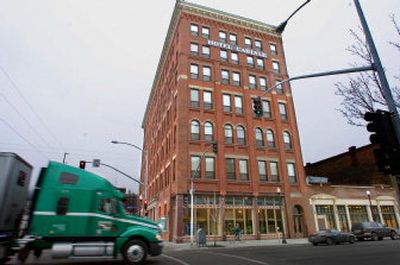Spokane looking to sell Carlyle

Two weeks after quietly purchasing a historic former hotel, the city of Spokane will begin the search for a new owner next week.
“It is not our intention to make money on it,” said Mike Adolphae, the city’s community development director. “We want to secure the building and keep it open. Our desire would certainly be to recoup our costs.”
In late November, the city bid $3.2 million for the former Carlyle Hotel, which carried $12.6 million in debt into a bank foreclosure. The proceeding allowed the city to shed more than $9 million in debt from the building – at the expense of US Bank, local contractors and other creditors. City officials said removing the debt will make the property more attractive to potential buyers.
Adolphae said several parties have expressed interest in the building, including a group working with former owner Jim Delegans.
“Price is a factor, but we also want to put it in the hands of someone who has the skills to manage it,” he said. “We don’t want to get into this position in the future.”
Six years ago, Delegans spent millions transforming the building into a 138-bed residential care facility for people with severe mental illness and complex medical problems.
The Carlyle Care Center provides housing to some of the most difficult-to-place residents in the public mental health system and receives $42 a day for each resident. Delegans said the payments were too low to allow the building to be financially viable, given the size of its debt.
The city, which loaned nearly $1 million in federal funds to the century-old building, could be forced to pay back the money if the building’s use changes. If the city cannot find a suitable buyer willing to maintain the Carlyle for low-income housing, it may be forced to auction off the building to the highest bidder – regardless of the use, Adolphae said.
Clayton Shum, a financial planner in San Francisco, has also expressed interest in the building, which he said he would maintain as a residential care facility. He questioned whether the city should sell the building back to Delegans.
“How can someone with so much debt go back and get it?” Shum said.
Delegans said his group is uniquely positioned to purchase the building because of his extensive experience with the Carlyle. He said a bank study found that the building’s management was financially sound.
“I understand (Shum’s) assertion, but it’s without merit,” Delegans said. “It was doing everything right except for one thing: It wasn’t being adequately compensated for the services it was required to provide.”
Adolphae said the city plans to begin considering proposals early next year.